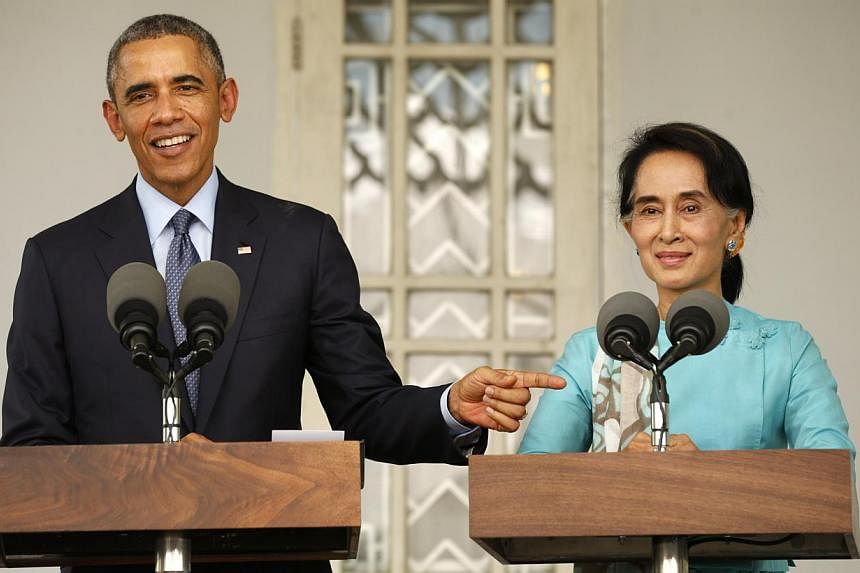YANGON (AFP) - Opposition leader Aung San Suu Kyi on Friday described Myanmar's constitution as "unfair, unjust and undemocratic" after talks with US president Barack Obama in her Yangon home.
Ms Suu Kyi is barred from running for the presidency of her nation by a charter clause, an issue Mr Obama also spoke out against during a joint press conference.
Mr Obama, visiting Myanmar's opposition leader, supported her saying a provision in the Southeast Asian nation's constitution that prevents candidates from running for president because of their children's nationality made no sense.
He did not name Ms Suu Kyi, who is barred from contesting the presidency in elections next year because her two sons are foreign nationals.
He also urged Myanmar to hold "free, fair and inclusive" elections as he threw his weight behind Ms Suu Kyi to change a constitution that bars her from the presidency.
Mr Obama held talks with fellow Nobel laureate Suu Kyi at her lakeside villa in Myanmar's commercial capital Yangon, after arriving from the capital Naypyidaw where he discussed the nation's troubled reform process with President Thein Sein.
Speaking at a joint press conference he warned Myanmar's reforms since shedding outright military rule in 2011 were by "no means complete or irreversible" and called for "free, fair and inclusive" elections in the nation, where Ms Suu Kyi and her party are set to contest crucial polls next year.
Ms Suu Kyi, who has publicly stated her desire to be president, is barred from the top office by a constitutional clause ruling out anyone with foreign spouse or children from the presidency. Her late husband and two sons are British and the democracy champion is seeking an amendment.
Using strong language, Mr Obama took up the issue telling reporters that "the amendment process needs to reflect inclusion rather than exclusion." "I don't understand the provision that would bar somebody from running for president because of who his (someone's) children are."
Ms Suu Kyi, whose National League for Democracy (NLD) party is widely expected to sweep polls in late 2015, branded the contentious clause as "unfair, unjust and undemocratic" adding "it is not right to discriminate against one particular citizen". The issue is currently being debated in parliament, where 25 percent of the seats are ring-fenced for the military.
"The majority of our people understand that this constitution cannot stand as it is," if democracy is to be achieved, the democracy figurehead added.
The pair spoke in the garden of Ms Suu Kyi's villa in a reprise of their landmark meeting in 2012, which saw the US leader throw his political might behind Myanmar's transition from junta rule.
After talks with his counterpart Thein Sein late Thursday Mr Obama expressed cautious optimism for the once-cloistered nation that balanced out earlier warnings on the risks of "backsliding" on the transition. "We recognise change is hard and you do not always move in a straight line but I'm optimistic," Mr Obama said.
During his two-night trip to Myanmar the US leader has also raised alarm over the direction of reforms, however, citing the cramping of freedom of expression, ongoing conflicts and the treatment of Myanmar's minority groups - especially the Muslim Rohingya.

